In this Article:
Those of you who read my reviews and articles know that I am by and large a handgun guy. I cut my shooting teeth on that type of firearm. I guess growing up in a state that did not allow “regular†rifle calibers for deer hunting (only pistol calibers were legal) until fairly recently may have had something to do with my bias towards the short arm. Enter some new regulations for deer hunting and the proliferation of coyotes in the fields across the road from our front yard and bingo – rifles are cool! I have the required .22, a Ruger 10/22 along with several others. The one that has taken the most deer is a Savage Axis II XP in .243.
- Adjustable Accutrigger
- Pillar bedded stock
- Large tang safety
- Detachable box magazine
- Durable and reliable
- Great value
- Good action
- Cost-effective
- Crappy stock
- Plastic clip on magazine
BONUS OFFER: Get your free shooting range targets to print at home!
Get your free targets to print at home!
A Little Backstory
I never really thought about owning such a critter much before a few years ago until the deer laws changed and the coyotes developed even-more-pushy personalities. Then I thought that it might be good to have something that could reach out farther than my .44 Magnum S&W could, which this gun does admirably. (I was a deer hunter before but I used that .44 and a Ruger .45 Colt – I am in the approximate 1% of hunters in my state that take deer with a handgun. The latest actual statistics are available for 2016, with the percentage of deer kills by a handgun at around .5%). Why do I mention this? I just want to make the point that I was a dedicated handgun hunter but wanted to expand my universe to include a centerfire rifle that didn’t shoot a pistol cartridge, and I found a dandy.
OK…enough about that. This review is about the Savage Axis IIXP. I think one of the best ways to talk about one rifle is to compare it with a similar rifle from another manufacturer. I had the opportunity to check out a Mossberg Patriot Predator that belongs to one of our sons – let’s look at both guns and then go from there.
The Savage Axis II XP
Savage is a company that has been around a while. The company was founded in 1894 by Arthur Savage in Utica, New York. Within a few years they were making rifles, handguns and ammunition. They built the first hammerless lever-action rifle, the model 1895. A lot of shooters don’t know that Savage was one of the two finalists in the Army’s pistol trials that ended with the adoption of the Colt Model of 1911 .45 ACP. I discovered that fact when I was researching the old warhorse and its cartridge for an earlier article. You can read about the Colt’s history, and the .45 ACP’s. Needless to say, the Colt won the contract but what is interesting is the fact that the Savage made it to the finals. This, from a company that now is known for its rifles – not handguns. The company, after merging with another company, produced Lewis machine guns during WWI.
In 1919, this logo made its first appearance:
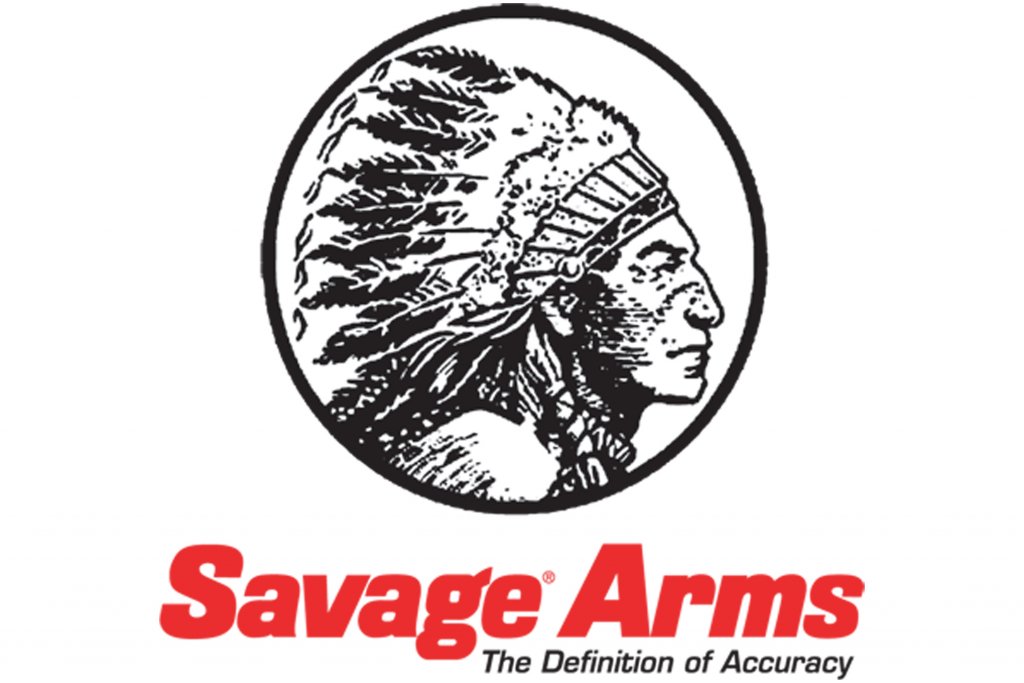
How do we go from a company in New York to a logo with the head of this distinguished gentleman? Well, that was the year that Chief Lame Deer approached Arthur Savage about building rifles at a discount for his tribe in New York in exchange for his likeness and a yearly fee. It’s interesting to note that the fee has been paid yearly, right up through 2018. Now, Savage uses a logo that looks like this:
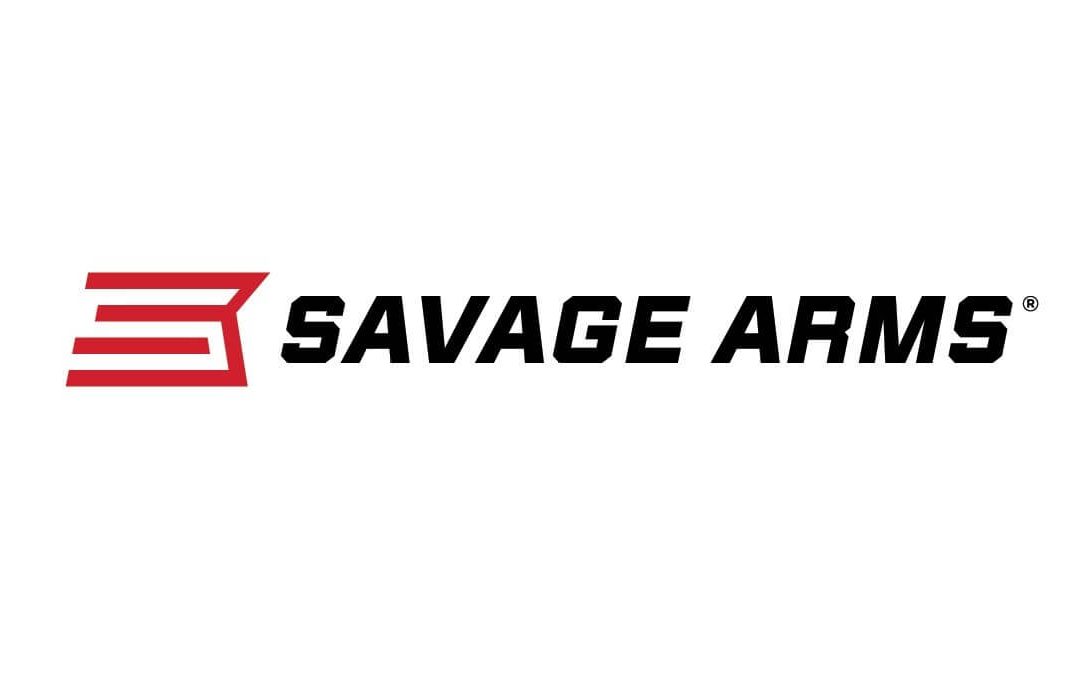
I’ll leave it to you, dear reader, as to why the company changed its logo.
On with the story – in 1920, Savage acquired the Stevens Arms company and followed it up nine years later by buying the A.H. Fox Gun Company and moving its production to Utica. Fox was known for its fine shotguns, and Stevens had made popular the rifle-shotgun combination gun. This allowed Savage to expand production into these areas, with the model 39 combination rifle-shotgun being introduced in 1939 and a line of inexpensive double-barrel shotguns around that time. WWII saw the company making Thompson sub-machine guns and Lee-Enfield rifles for the British. To hurry this narrative up a little, know that the company filed for bankruptcy in 1988, but emerged from those ashes very strong.
The famous AccuTrigger was introduced in 2002, and the company was named Manufacturer of the Year in 2003 by the Shooting Industry Academy of Excellence. The rest is fairly evident if walk into a gun shop and see a Savage rifle for sale – they’re doing pretty well, by all measurements of success. Another indicator is the variety of rifles they make – a visit to their website yields too many models to name. They make a lot of rifles.
Comparing Two Budget Rifles
Now, let’s look at specific rifles. As far as the caliber of my Savage rifle, I settled on the .243 Winchester one day when I was in my friend Duane’s gun shop and saw his display of Ruger and Savage bargain rifles. With this caliber, I could hunt deer, coyotes and other small-to-medium size critters. I call them “bargain†guns because they cost less than $500, my arbitrary budget-price cut-off point. The Savage Axis II XP lists for $495 but I paid much less for it at the shop, and it even included a Bushnell Banner 3x9x40 scope. (I know, that’s not a great scope but mine works like a charm).
Being the unrepentant reloader that I am, I immediately got a set of dies, some bullets (couldn’t use my home-cast here), and the proper powders. I started putting together some loads using once-fired Winchester factory cases. I was rewarded, eventually, with small groups but the group that got my attention was one three-shot group that was fired with Winchester factory stuff which measured .41 inch – more on shooting this rifle later. My handloads were not far off that mark.
I subsequently learned that the aged .243 is one of the more accurate rifle calibers out there, being based on the .308 case and for other reasons. That meant short-action rifles could chamber it which opened up a vista of possibilities back in 1955 when it was introduced. The thing just took off, being an accurate, versatile caliber with very little recoil. So, I ended up with the Savage in .243.
Popular Articles
The Mossberg Patriot Predator
The other budget rifle I would like to use for comparison is the Mossberg Patriot Predator. This is a popular gun that sells very well and is in the same price range as my Savage. Son Andy picked up one of these rifles at the same shop a while later. This rifle was either a trade-in or consignment (probably the latter) that had obviously never been shot. (I think I remember being told that it had been won in a raffle by its previous owner).
It was chambered in the modern super-duper caliber, 6.5 Creedmoor. This caliber has taken off like a bat out of you-know-where. Introduced by Hornady in 2007, this round (like the .243) was originally based on the .308 case. Developed for long-range target shooting, the 6.5 Creedmoor has earned its share of kudos in that arena but we also know it is popular with hunters. .264-caliber bullets are generally known for their high sectional density and ballistic coefficients. This allows them to be accurate and effective at long ranges.
Development occurred via a partnership between Hornady Senior Ballistics Scientist Dave Emary and Dennis DeMille, VP of product development for Creedmoor Sports. Now we see where the name comes from. At any rate, Andy had for all intents and purposes a new Mossberg in this great caliber – he also has a Savage .308 that he likes but he’ll be carrying the Mossberg in the deer woods this fall.
Now that we’ve had a bit of history about these two calibers, let’s look at the rifles. Here are specifications for each of them – we’ll look at these first then get into a bit more detail later.
Why I Like The Savage
I like my Savage. I understand that it is an entry-level rifle, but also know that, if I wanted a more sophisticated platform, I could stay within the Savage brand and get a real uptown model, with all the bells & whistles. The advantage of being able to do that is that you can learn on a “beginner†rifle, switch to a more advanced model and not have to learn new ways of operating said rifle. The procedures stay pretty much the same. Now, I get it – most manufacturers make what Sears used to call “good-better-best” rifles, but I like the Savage.
The trigger is an improvement over the older plain-Axis models and is all I need. (The .41-inch-group I show below is proof of that). The safety is in exactly the right spot for this left-hander…right on top of the stock wrist, behind the bolt. That is huge. I was sitting in a deer blind with my son, who had an older wood-stock Savage 110 variation in .308, and watched him as he took his gun off safe to get ready for a shot. He very slightly moved his hand in order to disengage the safety. Now, if we were sitting in the open, that could be enough to put wings under that deer and “there he was…gone!â€. I’ve had deer spook with lesser movement. We learn by doing. My point being that, when the time came for me to break the shot, I slid my thumb to the tang-mounted safety and “snicked†it off with no perceivable motion that could give me away. This is a very small thing, but those of you out there who’ve been in similar circumstances know what I’m talking about.
BONUS OFFER: Get your free shooting range targets to print at home!
Get your free targets to print at home!
Another thing I like about my rifle is the texturing on the forend and on the pistol grip. We hunt in November and December, and brother, it can be cold here. Add in a pair of insulated gloves and it doesn’t take much of a mis-move to drop your rifle. The texturing allows me to get a firm grasp on the gun and to keep my hands there, even with bulky gloves on. I’ve experienced slick stocks on both long guns and handguns, and it’s not fun to have to try to catch the gun as it slips from your frozen fingers.
One last plus is the accuracy. I know that rifle accuracy can be an ephemeral, flighty thing that doesn’t always fall on the gun you have in your hands at the time. It just seems that the Axis IIXP is born accurate, at least those that belong to some shooters I’ve talked with. Mind, mine is the bargain-basement model that sells for around $400 with a scope and is not the almost-custom-shop level guns that Savage also makes. I was truly impressed with this rifle, especially when it shot a less-than-half minute of angle group at 100 yards. I said up top that I am a handgun guy, first and foremost, and for me to get a group like that, this gun must be something sort of special. One can forgive a rifle almost any fault, but if it ain’t accurate, nobody wants it.
OK. I said we were going to look at the Savage alongside the Mossberg, so let’s look at some specifications…
Savage Axis II XP vs Mossberg Patriot Predator
| Savage Axis II XP | Mossberg Patriot Predator | |
|---|---|---|
| MSRP: | $495 | $540 |
| Action: | Bolt | Bolt |
| Barrel Color: | Black | Cerakote Patriot Brown |
| Barrel Finish: | Matte | Matte |
| Barrel Length: | 20 in. | 22 in. |
| Barrel Material: | Carbon Steel | Carbon Steel |
| Caliber: | 243 Winchester | 6.5 Creedmoor |
| Magazine Capacity: | 4, detachable box | 5, detachable box |
| Length of Pull: | 12.75 in. | 13.75 in. |
| Overall Length: | 39.5 in. | 42.25 in. |
| Rate of Twist: | 1 in 9.25 in. | 1 in 8 in. |
| Receiver Color: | Black | Cerakote Patriot Brown |
| Receiver Finish: | Matte | Matte |
| Receiver Material: | Carbon Steel | Carbon Steel |
| Stock Color: | Black | Strata Camo |
| Stock Finish: | Matte | Matte |
| Stock Material: | Synthetic | Synthetic |
| Stock Type: | Sporter | Sporter |
| Weight: | 7.3 lbs. | 6.5 lbs. |
The rifles are similar enough to each other, with a few exceptions. They both shot very well, with about the same felt recoil – that is, not a lot. The .243 delivers about 9 lbs. of recoil with the 6.5 dishing up just a tad more. At any rate, these guns are not going to punish your shoulder. One main difference between the two is that the Mossberg has a threaded barrel and would accept a muzzle device of some sort – suppressor, muzzle brake – although I’m not sure why you’d put a muzzle brake on this barely-recoiling rifle. Suppressor, possibly but then you get into the subsonic debate.
The 6.5 Creedmoor was not meant to be fired in subsonic form. The weight difference is not all that great – hard to tell by carrying one after the other. The stock – ah, there’s the difference. Although both stocks are synthetic, the Mossberg’s camo stock seems more at home in the woods. But, I’ve hunted more than one season with my Savage and the matte black stock disappears in a hunting blind. I’ll keep my matte black stock just the way it is, thank you. And, speaking of stocks, I can’t hit home enough about the texturing that Savage puts into their synthetic stocks (at least they did when they made this series of Axis rifles).
Triggers
Let’s talk for just a minute on the two triggers these rifles employ. The Savage uses what they call the AccuTrigger. They have a short video about their trigger – you can watch it here. Basically, it’s a pre-set, light trigger that is user-adjustable for pull length – if you want a longer pull or shorter, you can do that. The blade in the trigger is called the AccuRelease (marketing…). It catches the sear if the gun is jarred or dropped, preventing the rifle from firing inadvertently.
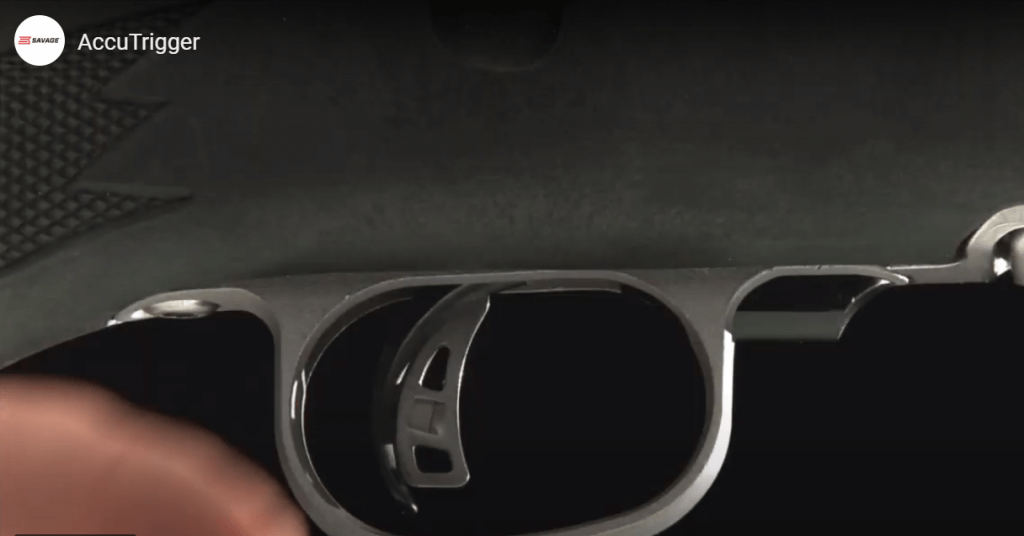
About all I could find out about the Mossberg LBA (Lightning Bolt Action) adjustable trigger is that it is user-adjustable from 2 – 7 pounds…
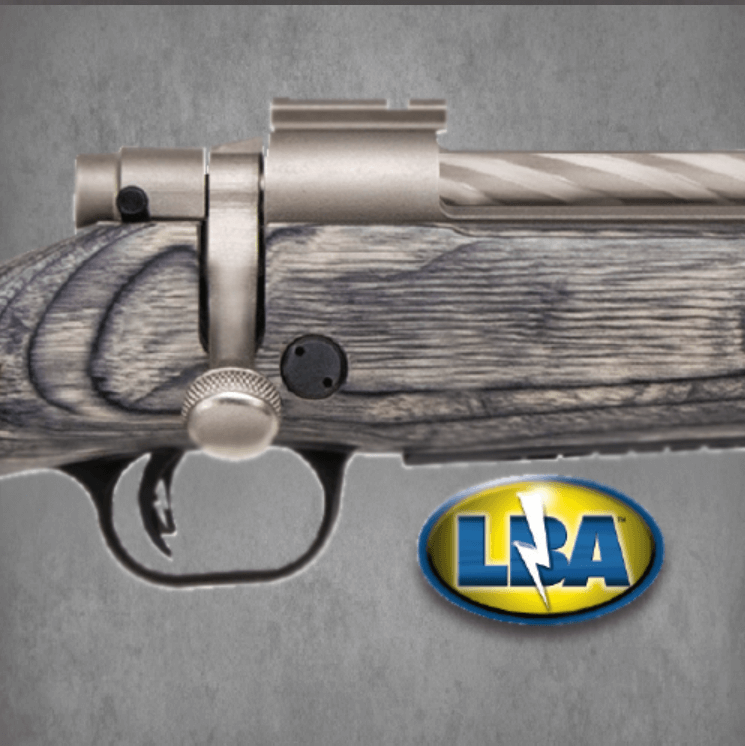
The thing about triggers on most any modern rifle is that they are light years ahead of the stock trigger on an entry-level budget rifle of years ago. These triggers allow some really nice shooting to happen without the added expense of going to an aftermarket trigger or paying a gunsmith beaucoup bucks to work on it. Can you do better? Of course. The top-line target rifles will have a more sensitive, adjustable trigger – in some cases, with a pull weight of down to a few ounces. On a hunting gun, though, you don’t really want an ultralight trigger. It’s too easy to snag the trigger guard on a branch, with an ensuing “kaboom†as a result. For entry-level hunting guns, these triggers are fine. The Mossberg’s trigger did feel a bit “mushier†than that in the Savage, although the final results feel fairly equal. That sub-MOA group I shot with the Savage is proof that the trigger works. (I did not get a chance to measure the rifles’ trigger pulls with my Lyman gauge but, rest assured, both triggers are very usable the way they sit).
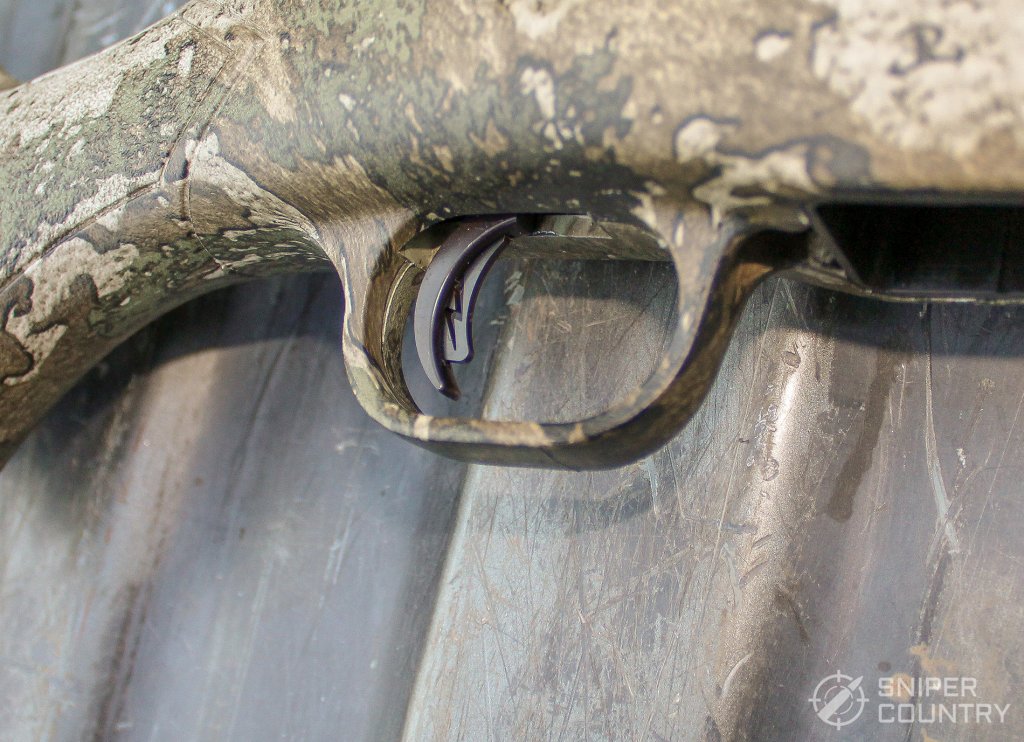
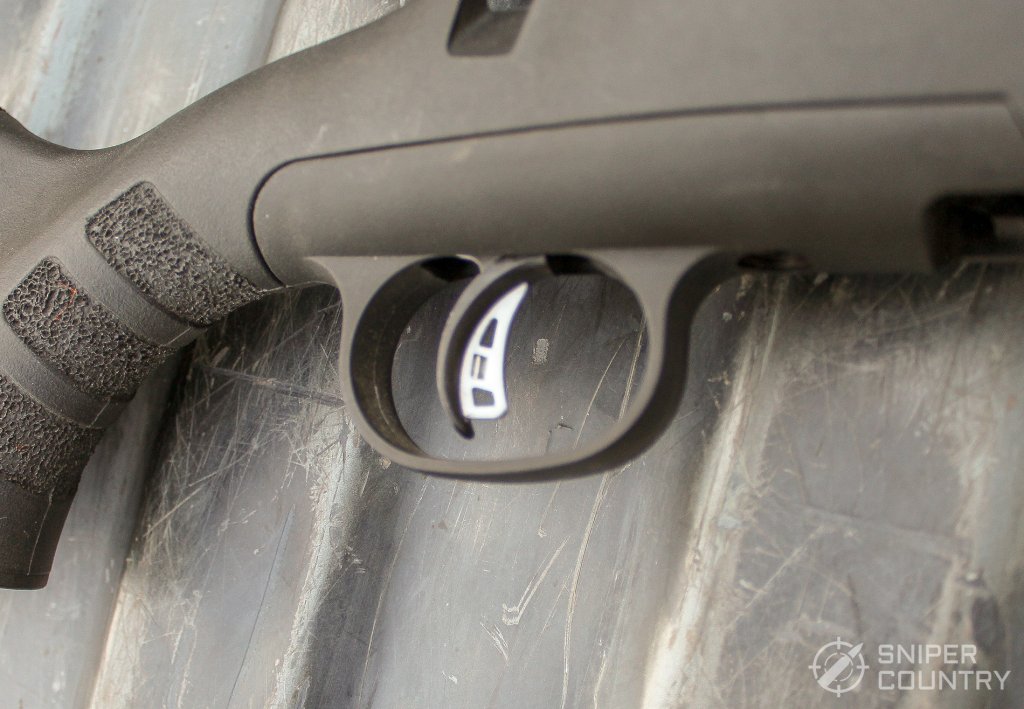
Each of these rifles shot at least MOA groups, so I think the triggers pass muster. Now, let’s look at the stocks…
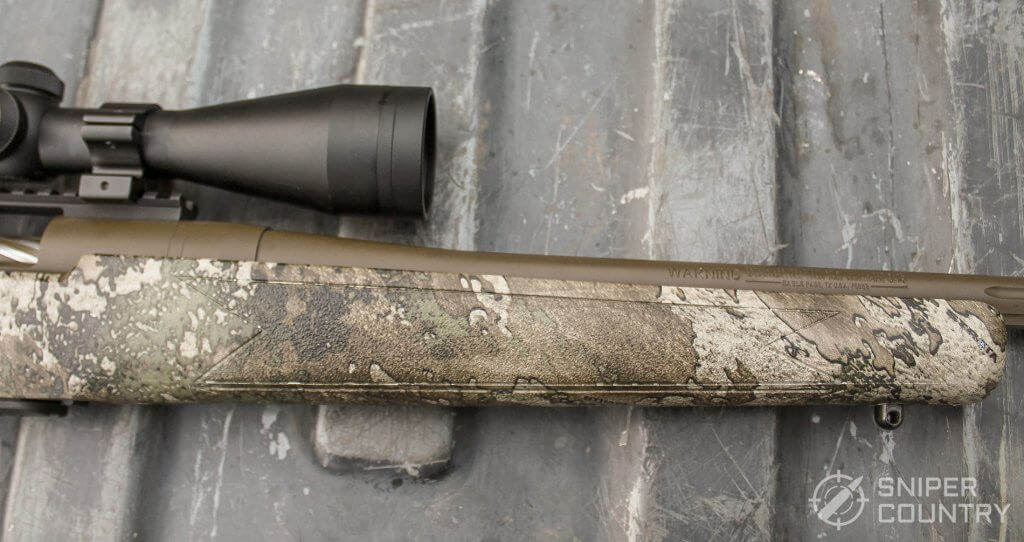
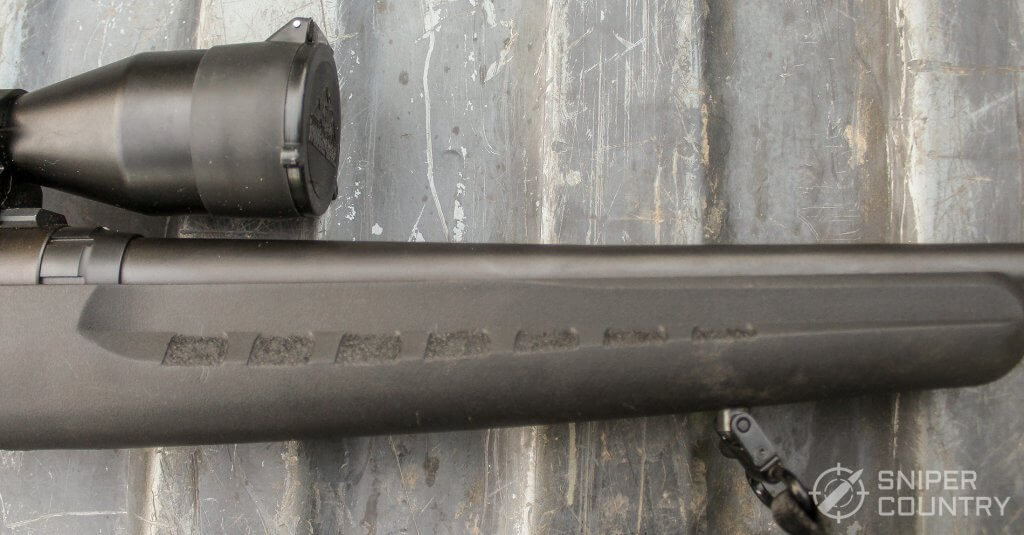
Both barrels are free-floated to the receiver. Notice the bit of texturing on the Savage – this does help if your hands are wet or cold.
Working our way rearward, here are the pistol grips. First, the Mossberg then the Savage. Again, there is more texturing on the Savage than on the Mossberg.
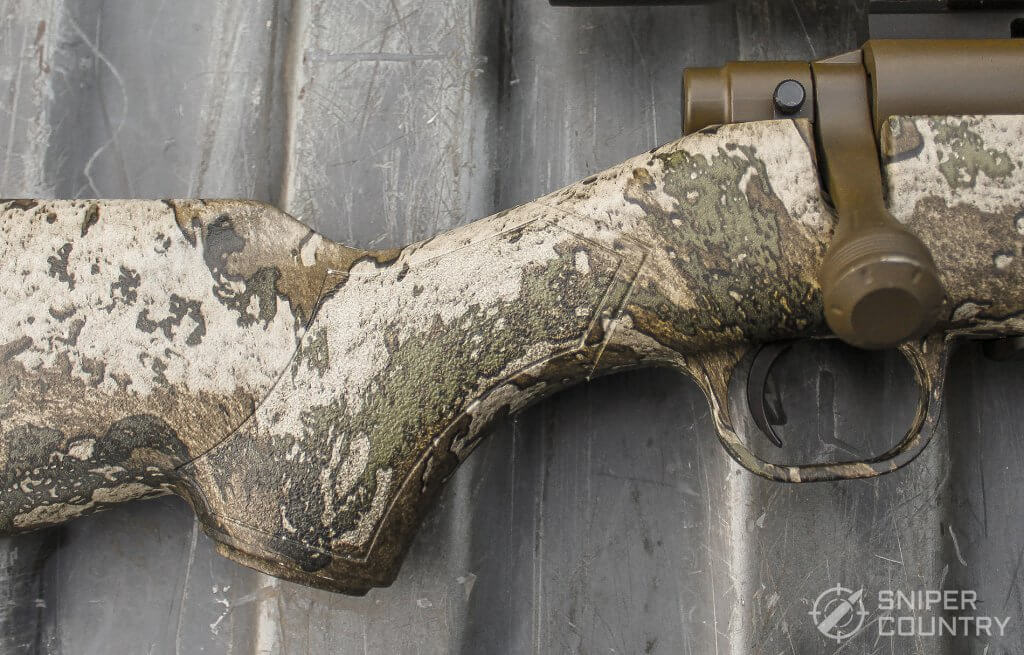
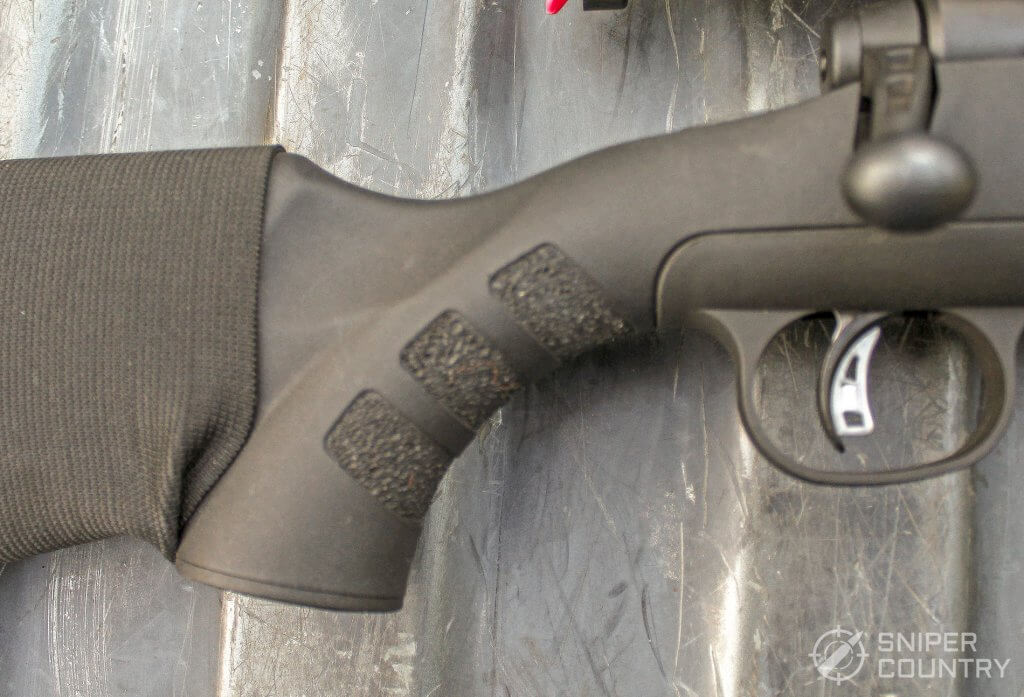
Now, the buttstocks. I didn’t take photos of the stocks because they are virtually identical. Each gun has a nice pad on the buttstock, with the Savage’s pad ventilated.
As far as these stocks go, they are inexpensively made (relatively) and tend to be a bit “whippy.†From a bench, the rifles are fine, but you might want to be aware of the flex factor. If you lean against a tree as an impromptu rest, try to keep even pressure on the forend. Not a big deal, just something to keep in mind. I use shooting sticks in the blind, either a monopod or bipod. That keeps the pressure on the bottom of the stock, not on just one side. The Savage stock seemed to be made of a bit thicker blend of plastic – it didn’t feel quite as “flexible†as the Mossberg stock, but that could have been me.
Bolts
The bolts are similar, with two locking lugs, a single claw extractor, and a spring-loaded ejector. There is not a whole lot of difference between these bolt faces than the bolt that was in my early-20th-century 8mm Mauser 24/47 surplus rifle. I guess the old saying still applies – if it ain’t broke, don’t fix it. The fluting on the Mossberg’s bolt body adds to the pizzazz factor and helps the bolt ride smoothly in the channel. But… I’ve never had a problem with my Savage’s bolt binding. Both are slicker than grease on a glass doorknob.
One thing about the bolt lift – each one of these requires a bit of effort to lift the bolt handle. I just figure that a slightly stiff bolt lift is endemic to the breed of lesser-expensive rifles. Again, no big deal, as this will even out with more shooting. A real plus about the Savage bolt is that it is very hard to get the bolt to bind when pushing on the bolt handle. If you hit the handle a bit off-center, the bolt usually still goes home, into the battery. I can’t say this for some other budget rifles’ bolts.
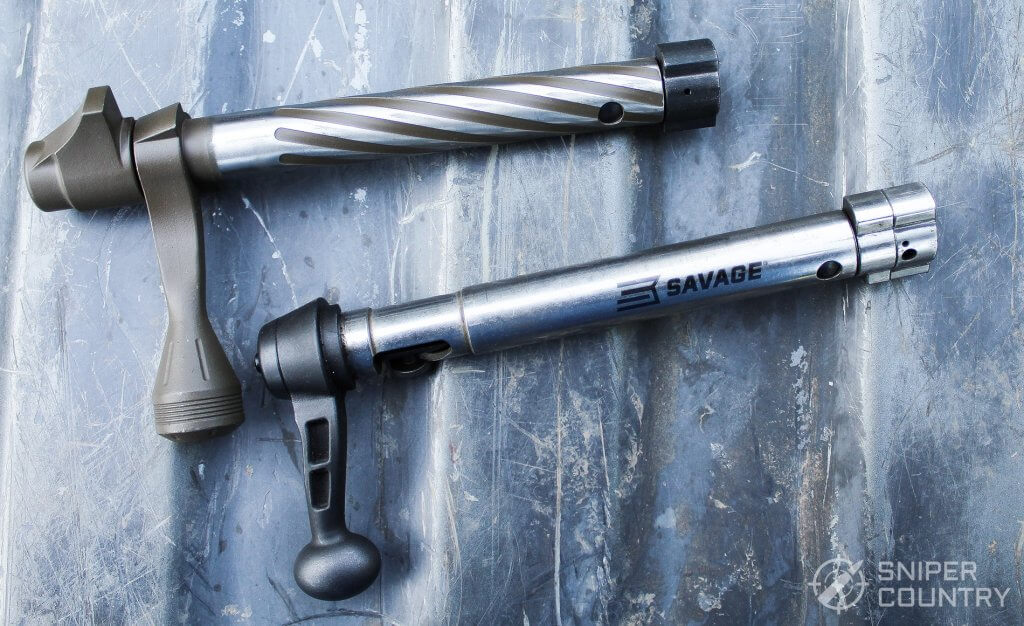
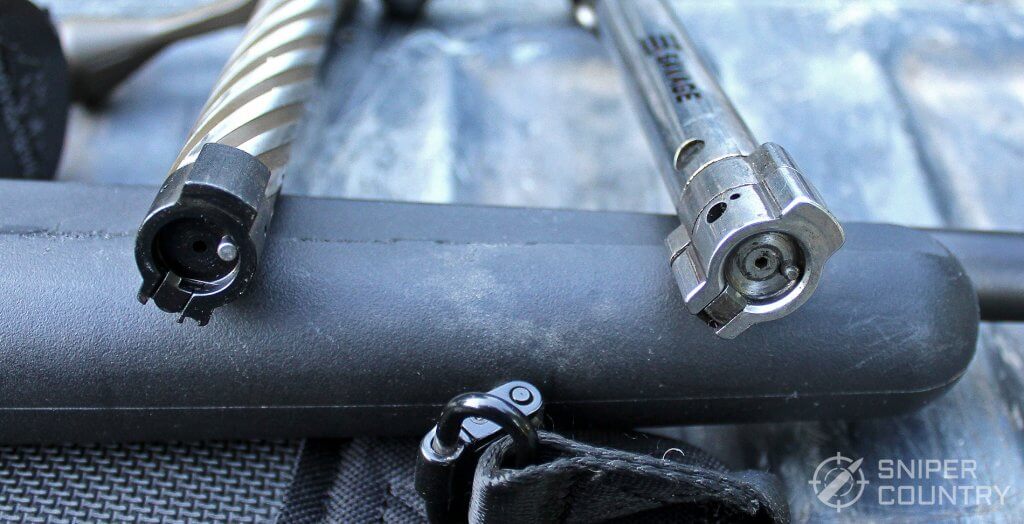
Here are the bolt releases. First, the Mossberg…
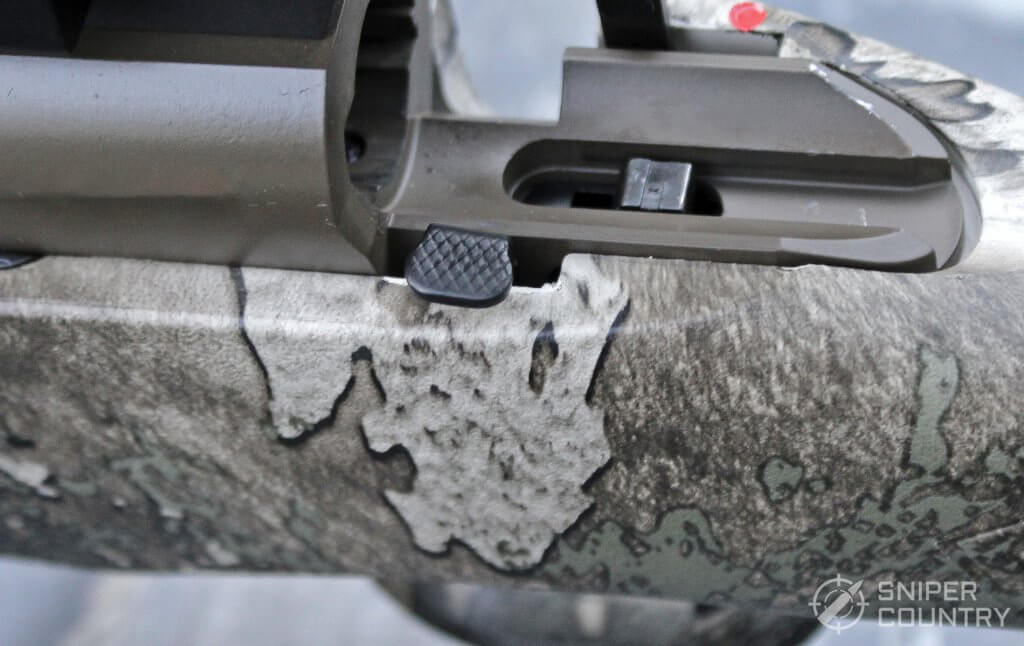
…and now the Savage:
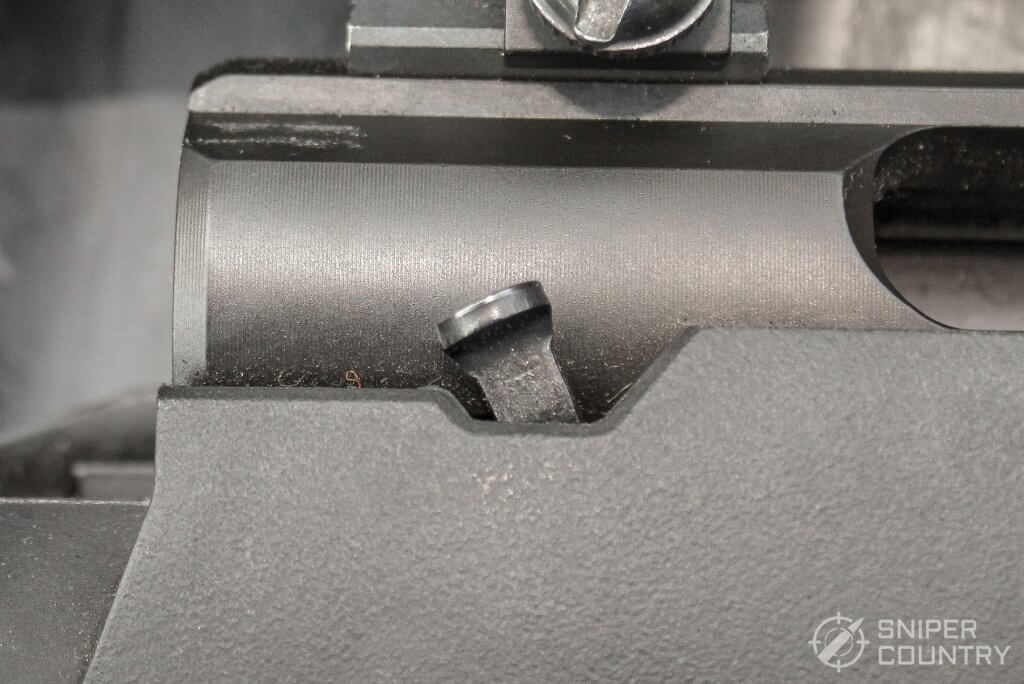
Both guns use a simple “press-this-lever-down”-type switch, but there is one big difference: the Savage requires you to pull the trigger in order to release the bolt. Until I learned the drill, I thought I needed three hands to remove the bolt. Once I figured it out, it was easy but there was a tiny learning curve. With the Mossberg, no trigger pull is needed. Just lift the bolt handle, press the bolt release and pull the bolt out.
Magazines & Safeties
The magazines are a bit different, in terms of construction. The Mossberg is a polymer and holds 5 rounds, while the Savage magazine is steel and holds four. I’ve had several pistols that use poly magazines and they worked fine, so I don’t think that’s a big deal. But, the Mossberg magazine well is polymer as well. Again, no big deal but it might matter to some. As for the safeties, the Mossberg uses a slider on the opposite side of the stock as the bolt release. This is traditional, but hard for lefties like me to operate. I like the Savage safety – it’s a slider on the tang on the wrist of the stock. Right on top where we lefties can get to it. Both safeties work fine but the Savage is more ergonomic, at least in my humble opinion.
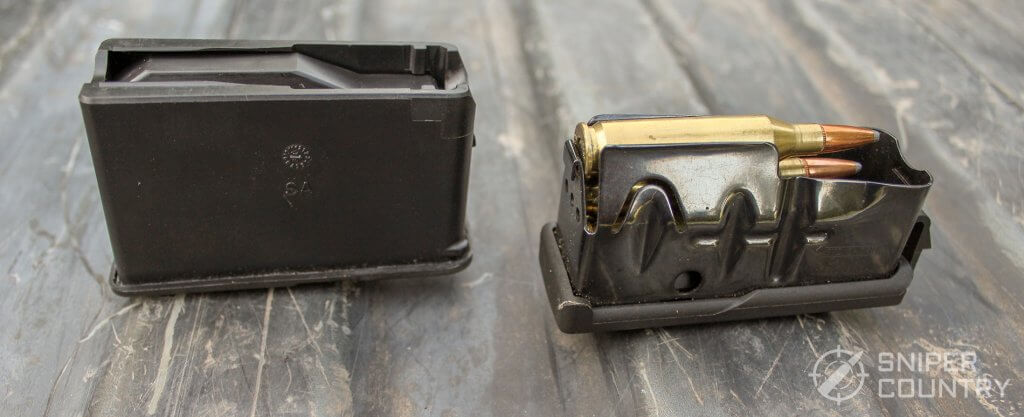
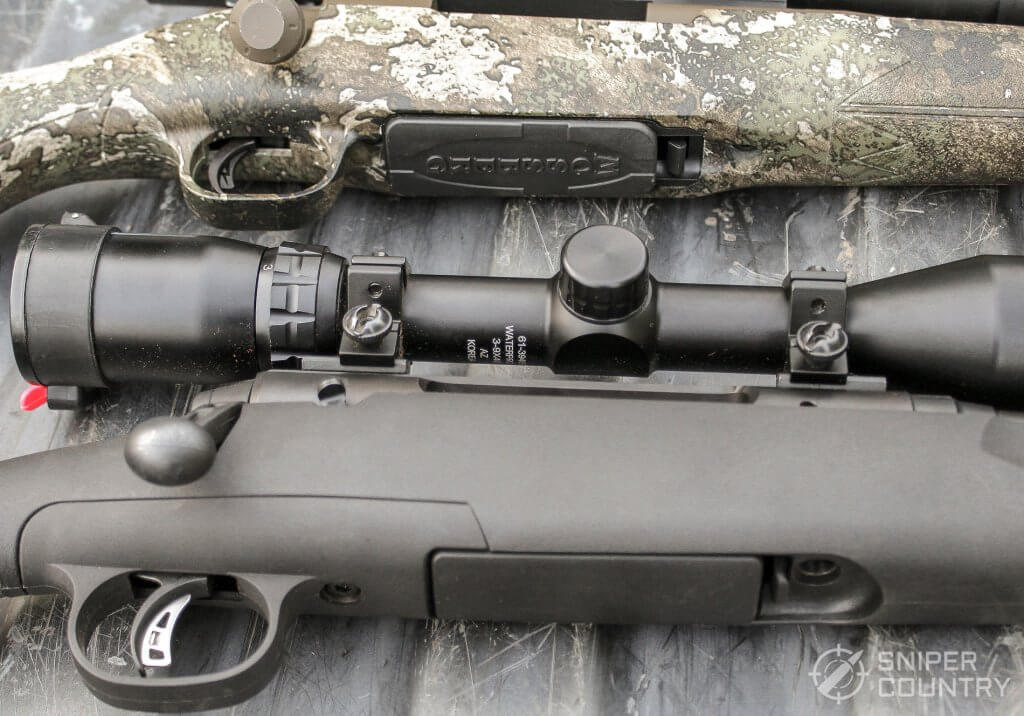
I like the fact that Savage uses a metal magazine and mag well. Another plus for me is the knob on the bolt handle – I like round knobs. Call me old-fashioned, but I like it.
Range Time
To put it in a nutshell – these guns can shoot. Collectively, more shots have gone down the Savage’s barrel than shots down the Mossberg’s. As I said above, the Mossberg had not been shot when Andy picked it up. He had not had an opportunity to shoot it until just recently, and then only for a few shots. He put a homemade box target up at his house, 100 yards out and went prone across his driveway…
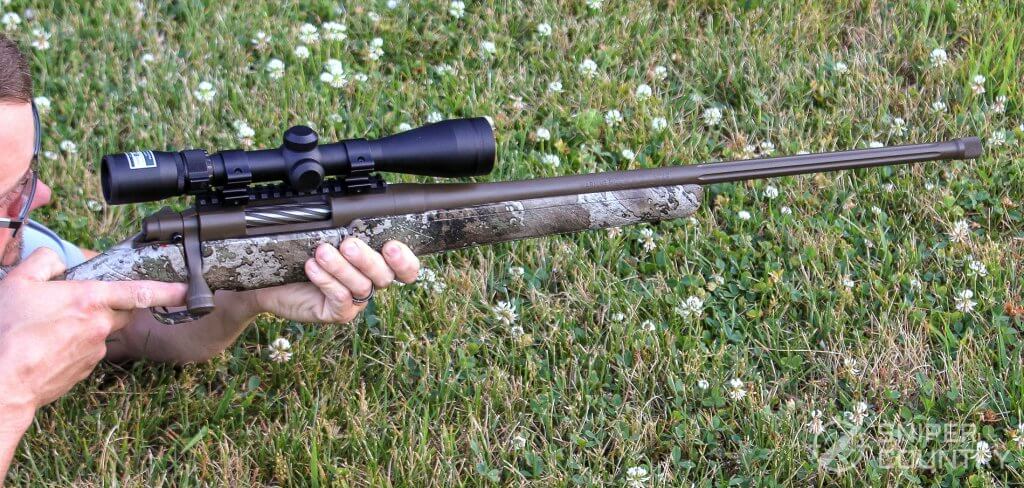
He fired a few, then went to his knee for a few more shots. It was about as informal as it could have gotten, especially since he had not adjusted the Nikon scope on his Mossberg. Later, when life slows down (does it ever?), he will shoot from an “official†bench at a real target for groups. At any rate, he didn’t do bad considering the conditions…
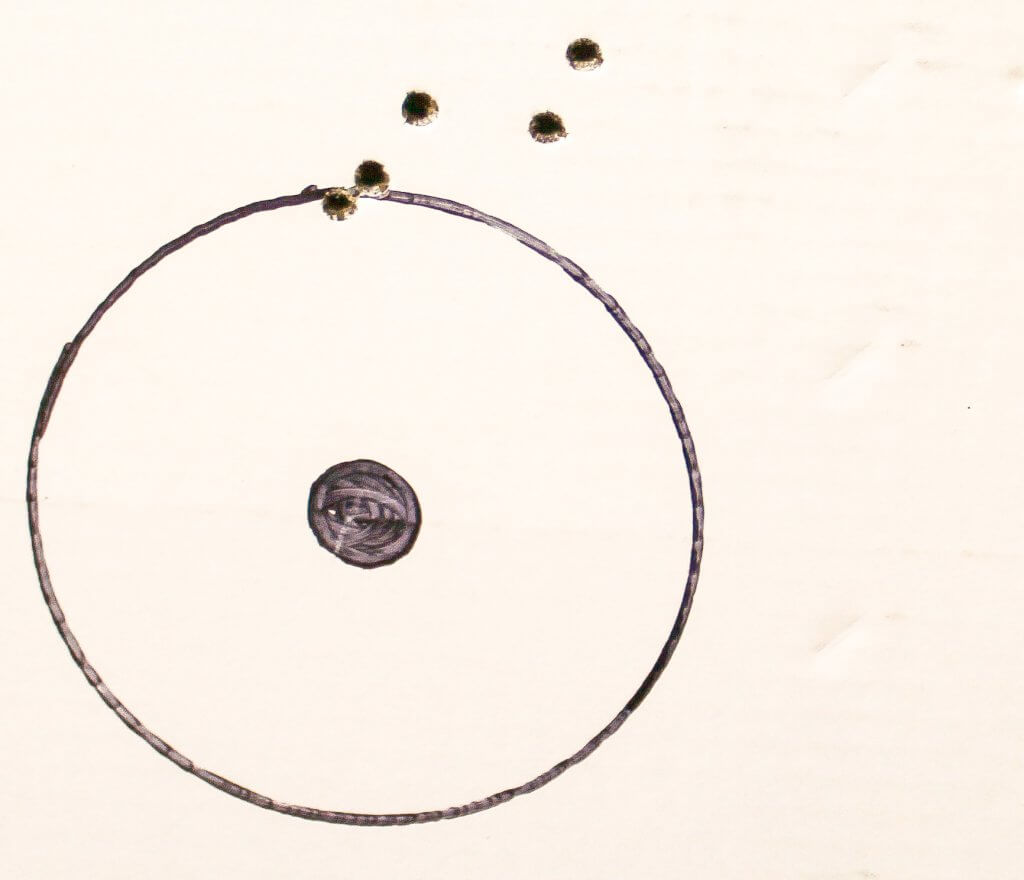
With the order he shot them, these bullets are very close to MOA accuracy. When he gets a chance to shoot for real, we’ll really see what the gun is capable of – he’s a very good shot. The only ammo he’d been able to get was some S&B 108-grain FMJ ammo he’d picked up with the gun. I have a box of Fiocchi stuff I want him to shoot – that is very good, consistent ammo. We will do that the first chance we have.
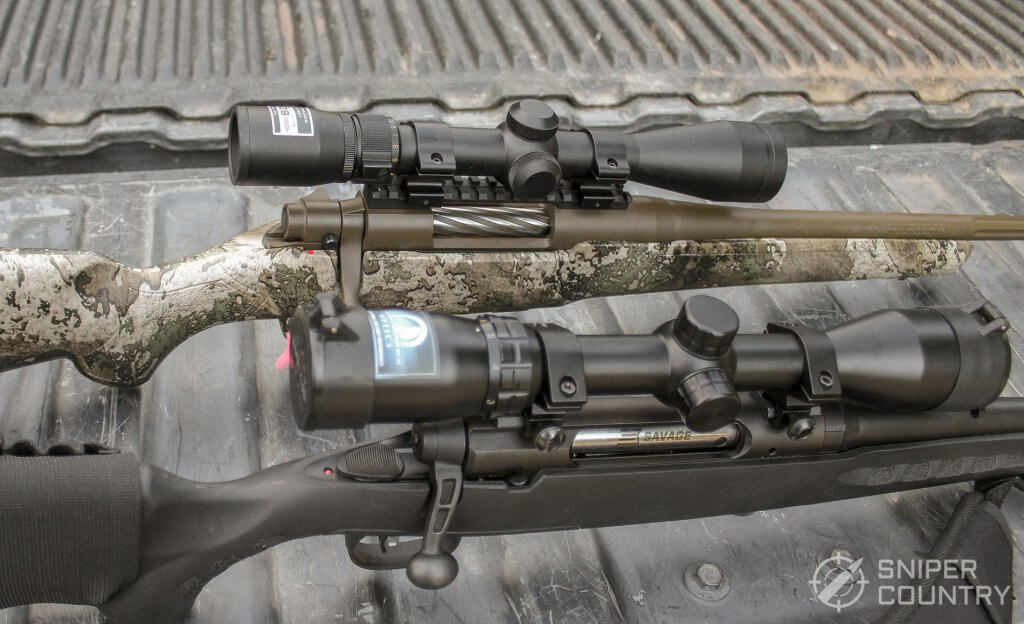
As for my Savage, I’d put probably the equivalent of 7-8 boxes of ammo through it, both factory and my handloads. It seems that my gun likes a 100-grain soft point over 42 grains of 4350 powder. It just kisses the 3,000 fps mark and is very accurate. However, this target was shot with Winchester 100-grain Super-X ammo, as the target shows. The 3-shot group is under a half inch at 100 yards…not too shabby, considering that I’m better with handguns as a rule. It seems that the Savage Axis owners that I’ve been able to talk to have experienced sub-MOA groups with their stock, factory rifles. That says a lot for the company.
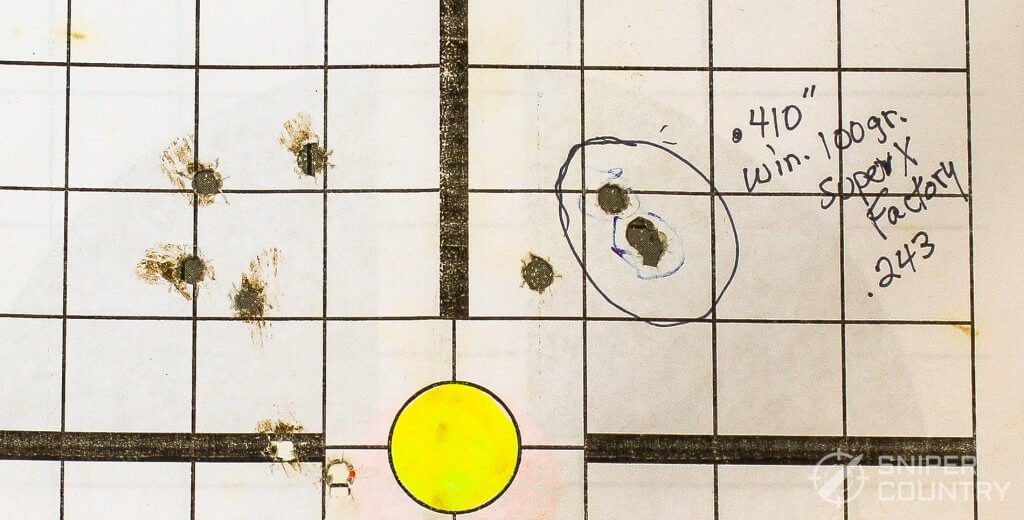
I guess that if even both guns shot only MOA, they would still be putting bullets into a 4-inch circle at 400 yards. So, these groups will do for now but the fun comes in the experimentation as we all know. Plus, deer are unpredictable – the last one I shot with this rifle was at about 70 yards. That’s revolver territory! Anyway, we will work up loads using my chronograph and back yard range. Again, that’s the fun part.
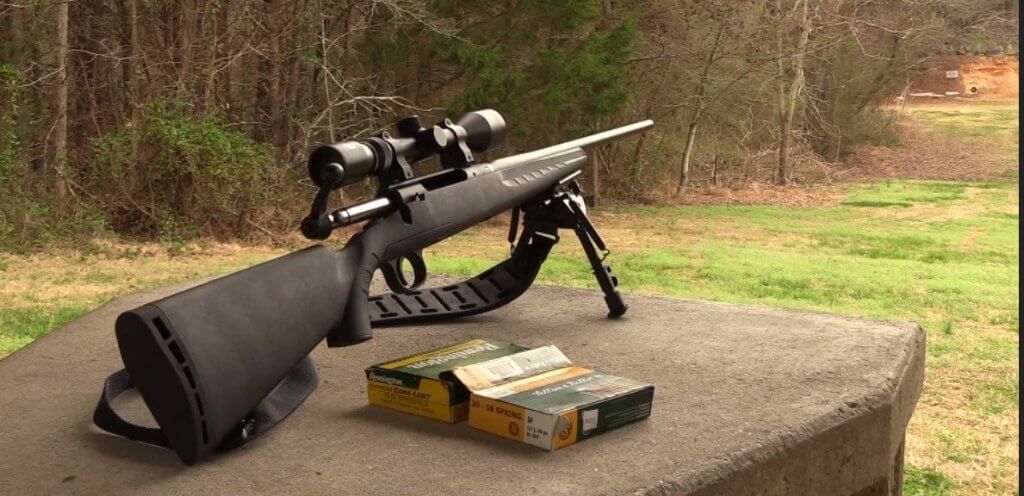
A versatile rifle. Here it is in .30-06 with a bipod – lethal on deer, or just about most anything that stalks the lower 48. Note the ventilated buttstock pad…it works.
Summing Up
I have tried, with this little exercise, to review the Savage Axis IIXP by itself and in comparison with another budget rifle. I purposely did not get into great detail, with micrometer measurements, facts, figures, etc. because I wanted this to be (as it’s titled) a quick review for those maybe considering picking up a rifle without spending a whole lot of money. Either of these guns would suffice for hunting deer-sized game at reasonable yardages or going into a coyote-rich environment and reducing their numbers a bit, but I really like my Savage.
I liked the threaded barrel and easier bolt removal of the Mossberg. But I think the Savage has it over its competitor with its tang-mounted safety, “more-grippable†stock, slightly heavier weight (still under 8 pounds) and the non-binding bolt. And, let us not forget the fact that it will shoot a 3-shot group at 100 yards tighter than ½ inch. This is a heck of a lot of gun for the money.
If you’ve had experience with the Savage Axis IIXP (or any Savage rifle, for that matter), feel free to chime in below. As always, shoot whenever you can and be safe!
Updated: July 2021
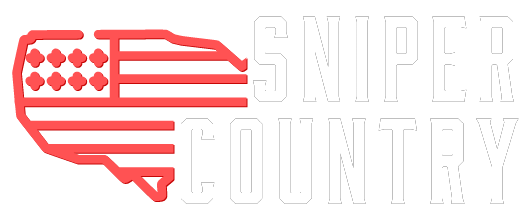
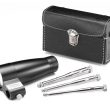
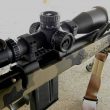
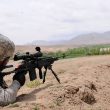
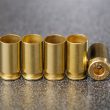

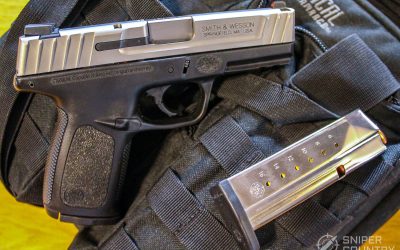

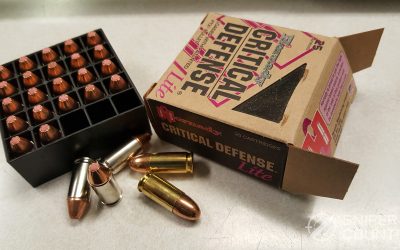
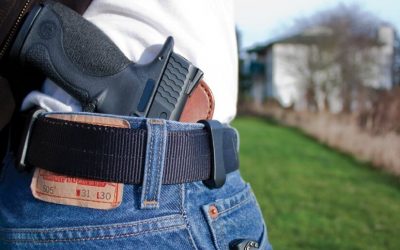
![9mm Glock Models [Ultimate Guide]](https://www.snipercountry.com/wp-content/uploads/2018/10/Glock-17-vs-Glock-19-vs-Glock-26-vs-Glock-41-vs-Glock-43-WM-400x250.jpg)
![Handgun Calibers [Ultimate Guide]](https://www.snipercountry.com/wp-content/uploads/2018/10/Handgun-Caliber-Comparison-400x250.jpg)
![Rifle Calibers [Ultimate Guide]](https://www.snipercountry.com/wp-content/uploads/2018/12/Header-1900-400x250.jpg)
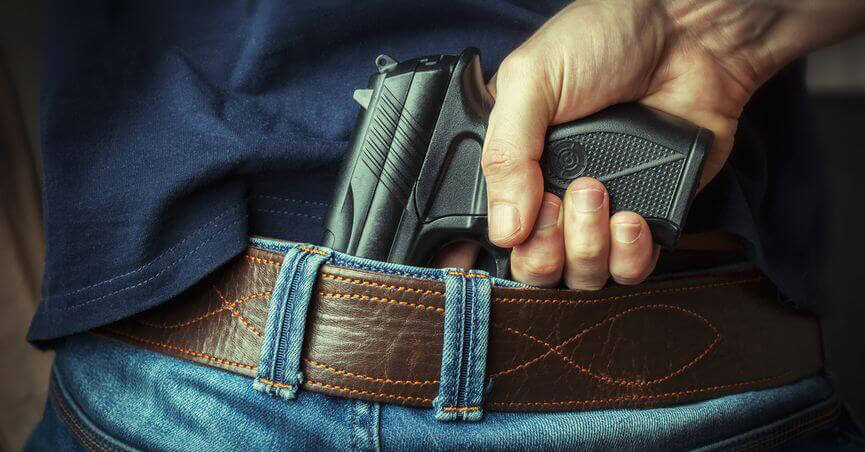
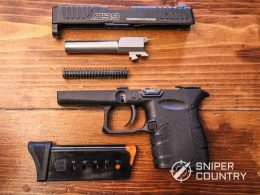
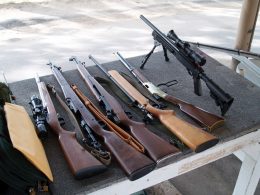
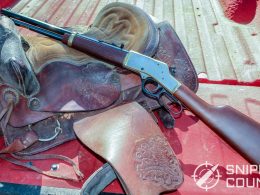
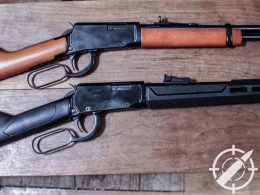

The Savage is a good gun, I have one in 30-06. Only complaint I could make is that the stock weaver 2 piece rail, and the scope rings are complete garbage. spend an extra 100$ and buy a 1 piece rail and proper rings. It will save you the headache of wondering why your zero keeps going off.
Shane, weaver does not make a two piece rail it is a two piece mount. I am 72 years old and have used weavers two piece mounts for longer than you are probably old, and they are well made, as is their rings. If you complaint is the rings are misaligned, have you had a gunsmith check them for alignment and lapped if needed? As far as using a “one piece rail and proper rings” are concerned the rings should still be checked for alignment and lapped if needed. One thing I suggest is using a one piece mount with integral rings. Then lapping is not required and you do not need to spend but $50-$60.
Shane, good point. I know some have problems with their zero wandering but mine seems to be OK. I appreciate your input-thanks for writing.
I have the Mossberg MVP in 6.5 Creedmoor and it will shoot a 3 shot one ragged hole at 100 and hit a 12″ steel at 1000. I must admit that the trigger kind of sucks and Im looking at replacing it with a Jard.
Howard if you are consistently ring a 12″ steel at 1000 yards. Why would you need to change the trigger in your rifle? Has someone convinced you that a Jard trigger can somehow shoot better?
Howard, glad you found an accurate rifle. The trigger is an easy fix-hope replacing it helps. Thanks for writing.
I have a savage axis,( not the II, the original) in 7mm-08, and am very happy with it. It doesn’t have the Accu-trigger, and I know a lot of people complain about the triggers on the original axis line, but I guess I got lucky, because mine is actually pretty good. It came with a 3X9 Weaver scope, which, to be honest, is rather meh. Not exactly outstanding in its light gathering ability, and didn’t want to adjust for awhile when I sighted it in. When it did though, I was able to sight in ok, and was able to ring the 300 yard gong on the one shot they gave me at it. One day, I’ll probably put a better scope on it, but for now, it’ll do.
Steve, sounds like it’s working for you. Glad you have an accurate rifle. I think you have a good gun if you own any Axis rifle, AccuTrigger or not. Thanks for writing.
Hi Mike,
The last photo is the Savage rifle in .30-06, while the whole article was about . 243. What do you think is a better caliber, .243 or .30-06 for a given rifle design? I am a novice, so sorry if the question does not make sense. But if you have a base rifle design, say Axis II, what caliber is it best for? If the design is a common frame, stock, and etc. Or maybe each Axis II has some design adjustments based on a caliber? Sorry, my experience is limited to Mossberg 500 that I have now, and AK-47 back from basic army training in Russia.
I did download the Sniper Country PDF that compares different calibers. That’s so nice! There is a comparison between .243 and .308, .30-06 and .308, so I sort of made comparison between .243 and .30-06, but if you actually shot both, .243 and .30-06, it will be very nice to know the differences.
Thank you!
Lev
Lev, first, it’s an honor to communicate with someone from Russia – I’m glad you’re reading my reviews! As for caliber, it all depends on what you want to do with your rifle. If you are hunting, and you are after some of the larger game animals in your area, the .30-06 would be better. If you are after white-tail-size deer and maybe bear or other similar-sized game at close to moderate ranges. you might look at .308 – it could be easier to get where you live (or maybe not – don’t know). The .243 is good for anything up to deer-size game out to around 300 yards or so but I wouldn’t want to push it further. The .243 might be a bit cheaper to shoot and will definitely be easier on your shoulder. Let us know if you have any other questions – there are a lot of readers out there with more centerfire rifle experience than I have. I really appreciate your comments-thanks for writing,
Hi Mike,
The honor is all mine! Although, I’ve been a US citizen and living in NY State for quite some time, some of my Russian/Soviet upbringing still shows up in my questions. To me, the abundance of different rifle platforms and calibers is mind boggling to this day. Very often I think, “if the same rifle comes in so many different calibers, and they all work well, how can it be?” For example, Axis || has a version chambered for 6.5 Creedmoor. After reading a comparison of 6.5 Creedmoor and .243 Winchester posted on this site, it sounded to me that the main advantage of 6.5 Creedmoor is at long distances, but then would Axis II be useful for long distances? That’s what my thinking process was when I asked the questions.
Thank you for the insights! Sounds like Axis II is good for use with any of the calibers it’s chambered for, and it all depends on application. I think .243 Winchester is something that I will look at.
Lev
Hey Lev,
I have talked to quite a few people new to shooting and your question is a very common one, but not necessarily easy to answer. The way that I would begin is to think of the caliber/gun type mix as a toolbox, the right tool for the job at hand. There are questions only you can answer that will lead you to the answer you are seeking.
What will you be using it for?
If you are looking for a hunting rifle, what will you be hunting? Small, medium, or large game?
Will you be carrying it for long periods of time or short distances? Sporter type rifles are lighter than say a bench-rest target rifle (Example: The Mossberg weighs 5 lbs and a bench-rest rifle could weigh 10 lbs or more). With a lighter weight rifle, there will more felt recoil so caliber now comes into consideration (larger caliber will result in more felt recoil). Felt recoil is judged differently by each person, it simply depends on what you are comfortable with.
Regarding design, there will be differences in “frame” size due to caliber but will have close to the same look (Example: Ruger 10/22 vs. Remington 700 in .300 Win Mag). There are many “specialized” stock types out there for different applications and preferences as well. Once again, your choice..
On a side note, you said you have experience with the AK-47. Love that platform, totally reliable and very effective in the right hands. There is something to be said about a semi-automatic .30 cal rifle. Anyway, where I was going with this is the felt recoil of the AK-47 will be much less than any bolt-action rifle, except maybe some of the smaller calibers ( I can’t speak for experience, I haven’t fired anything smaller than 7mm magnum in the bolt-action style), simply because much of the felt recoil is reduced by the action.
My best suggestion for you, as with most people I talk with, “test drive” as many types and styles that you can get your hands on. How does it feel in your hands? Does it shoulder well? Is it comfortable to use? Are the “controls” readily accessible or do you have to search for them? Simply saying, if it doesn’t feel right to you then you probably won’t feel safe to shoot it as much as you should to get proficient with it. It should be an extension of your body and be a joy to shoot.
Hope this helps,
BigD
Hi BigD,
Thank you for the detailed reply!
I guess I never considered looking at a rifle selection process from the angles of your post, especially a rifle being, “an extension of your body.” But that does make total sense.
I know that when I was shopping for a HD shotgun, after a brief research, I got Mossberg 500 Persuader. It turned out to be a good fit, but if I followed the advice from your post, who knows what I would have gotten.
Given your post and Mike’s, I’ll try finding a range where I can possibly rent Axis ||, Patriot, or similar in .243 Winchester. A range where I practice with a shotgun does not offer any of such rifles for rent.
Speaking of AK-47 design, you might find a book “Inside the Soviet Army” by Victor Suvorov interesting. Suvorov was a former Soviet Army Intelligence (GRU) officer, who defected to UK. While the book does not focus on AK-47, it provides very interesting insights on that army in general, and why some design decisions were made, with the reliability and the ability fix weapons easily, always being taken into a consideration.
“Part VI: Equipment” is dedicated to weapons, I found a PDF for download here
https://pdfs.semanticscholar.org/c89b/42c29ca2491edbbcd986377b2df4e6418602.pdf
Lev
Hey u sold me on the Savage brand…..lol truth is i bought one of Savages Axis I’s about 9yrs ago as a beginner! Not 48hrs later the Axis II came out and i was POed!LOL I bought one in the better of the two cartridges…. 6.5Creedmoor! LOL I have to say it is a very accurate cartridge and i think it will reach out a bit further and have more energy then the .243 once it hits its target,so…..hehe I know there are a lot of upgrades out there for the Axis specifically by only a few companies due to the not so common action although at Boyds its considered a Short Action Axis and i plan to get the At-One or Camp thumb hole stock?Not sure which just yet.But i also purchased a magazine adapter that modifies it to accept 10rd mags.Its made by a company called Armament Training Prodcuts. i have to then cut off the giant ugly plastic proprietary magazine design to the Axis.The adapter then works off the metal tabs cut into the mags them selves.So as long as its a Savage Bran Magazine i can use 10rd mags now.The other tidbit is when replacing the stocks to a Boyds or even a costly MDT will up your accuracy by a good bit!!! The claims are up to 40% better accuracy.I dont know if thats etched in stone but both companies and most after market chassis companies claim their stocks up the accuracy of most if not all rifles.So take that with a grain of salt! lolSo i plan to look into the new stock around end of summer and a bit of save up cash.Would love to let you know if those claims of accuracy are true?lol I dont care about the money really but i am partial to wood stocks.I am partial the the paintjob on the Mossberg though.I also thought of keeping it on the Savage stock as i do like it and bedding the barrel?Then i could paint it?I shoot it a lot and the barrel gets hot so.But yeah have loved Savage as it was my 1st long gun ever.Even before i Purchased the “gota Have” .22lr although i purchased a Marlin 795 which is pretty much a ruger 10/22 clone. I started ,kind of collecting ARs lol One in every Caliber! Then into AR10s!LOL my wife just hates me for a week after every purchase! hehe kidding. Great info and article although i would have liked the same company back ground for the Mossberg as you put into it for the Savage?I own firearms by both companies and just love them all or i wouldnt have them in my Gun Cabinet?Although the Mossy’s are all shotguns though!was looking at those rifle/shotguns though too in .410/22lr and they look like a great pest gun or even an SHTF hunting gun for small game?If anyone’s a prepper?I have a bit in me but we plan to shelter in place unless other crap forces us else where?I guess i feel anyone that hunts and likes the outdoors has a bit of a prepper in them to start with?Peace bro and great article!
Big Mike, glad you liked the review. I’m also glad you own a Savage. Sounds like you have the AR end of things covered, too! As for Mossberg company history, check this out– that is a good read. As for getting a new stock, please let us know here if it truly improves accuracy. I read those claims as well and wonder if they are accurate. I appreciate your comments-thanks for writing,
I will i plan to seriously shop for one in about a month.want to complement it with a good scope as well….i plan to zero it with the new scope and shoot at least 500rds thru it at the same range in roughly the same conditions.Then change the stock/chassis and do the same for 500rds.I will let you know h ow it dose and take some stills and maybe a short video?right now im very busy shopping for a new 6.5Grendel upper?lolI have a complete mill spec lower with a good trigger in it,just crying out for an upper?ROFL
Next time try out the Remington 783. I have the 20″ Compact in 308 with a Bushnell Trophy 1 – 4 X24 mounted. Off a folding table my son and I kept 5 brands of 165 gr hunting loads in 1 1/2 inch groups at 100 yards. Not bad for a $240 (minus $40 rebate) rifle and $130 (1/2 price) sale scope now 2 years old.
Rusty, you definitely have a winner! Remington makes great rifles, and have done so for many years. I just happened across the Savage and bought it, hence the review. Sounds like you have it figured out – thanks for writing.
Two points. the 6,5 Creedmore is not a neck down .308. Hornady developed the 6.5 Creedmoor round based off the 30 TC they had previously developed for Thompson Center. Accuracy wise, you Savage had an advantage, your barrel was broke in while the Mossberg was a new barrel. Now for my pet peeve, in todays world of firearms manufacturing, there is no “entry level” rifle. There are rifles that cost more and not shoot as well as these rifles you reviewed. There are rifles that have a refined appearance, but that has nothing to do with performance. I personally have a Mauser Mark X that I have had for almost 40 years, I haven’t hunted with it for years, because I don’t want to damage the finely finished walnut stock and the bright gloss bluing. If you definition of upgraded rifles, shotguns and even handguns is finish and cost, I still have ask do they out shoot what you call entry level guns?
Larry, good points. You are right about the case origin – I got hold of some bad info. You are right about the .30 TC case being the parent. The only reason I used the term “entry level” was that it might help some folks understand that it was an inexpensive gun. The internals between models are pretty much the same – you’re right about a refined appearance not necessarily equating to better performance. As for the photo of the group my son shot, it would have been better if he could shoot it off a bench – I just needed a target photo for the review that had a looming deadline. I’m sure his 6.5 will do as well as, if not better, than my .243 once he has broken the barrel in and can shoot off a proper support. I appreciate your info – thanks for writing!
What bipod do you have on that Savage…?
Al, the photo of the gun with the bipod was a stock shot I used, not my gun. Not sure about the bipod but I’m sure you could do a search and find something similar. Thanks for asking!
I shoot a standard trigger Axis .308 off the bipod available at Walmart. Sub-$300 package gun from Academy Sports, has the Bushnell scope.
Using the bench and my elbows, 250m it is minute of baseball. Using the bench and the inexpensive bipod, it is minute of golfball. Both with off the shelf generic brass cased 150gr fmj. With Monarch or Wolf steel cased 147gr and 150gr fmj, same distances, it opens up to minute of cantaloupe and minute of softball. With decent hunting ammunition, it averages minute of plastic lemon either way.
For me, any of the above is good enough, as it is a feral hog control rifle, only. Purpose bought to wear out helping a friend with a massive hog invasion. I shoot them, he has them processed and feeds families in need in his county. Covers my gas and restocks my expended rounds, never know what bargain basement rounds he will have, so I tested it with “garbage”… 5 years later, and several hundred rounds, it has not lost (or gained) anything. Average about 25 rounds per month.
It does its job and is inexpensive enough to replace when (if) it ever wears out. Doesn’t hold a candle to my costum tuned 1960s M70 .243, but then again, it doesn’t have to.
Jeff, the setup sounds like it works. I like the fact that the hogs feed local folks – that’s a good thing. We appreciate your comments – thanks!
You forgot to mention that the savage Axis II XP Has a pillar bedded stock whereas the Mossberg patriot does not.